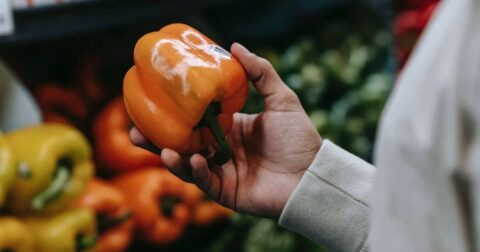News
People Can Give Cows Tuberculosis, But We Rarely Look For It
Health•5 min read
Explainer
While vegans omit all animal products from their diets, vegetarians still consume honey, milk, eggs, and other animal products.


Words by Calen Otto
In a world where diets are all over the news one day and forgotten about the next, it can be hard to keep a solid understanding of what each of them entails. Many people assume that veganism is just another diet trending right now, but in fact, a defining quality of veganism is that it is a lot more than just a diet. Veganism is an anti-speciesist movement and a set of ethics that leads people to follow a strictly plant-based diet as part of a broader change of behavior. Let’s talk about what veganism is, and how it differs from other types of plant-based diets.
To begin with, vegans do not eat animal flesh or fat, or any animal body parts or secretions—such as breastmilk, eggs, or honey. They commonly consume a diet made up of fruits, vegetables, nuts, seeds, legumes, and other plants. Vegans also reject wearing animal products such as leather or silk, and don’t participate in or support activities such as horseback riding or rodeos.
The term “plant-based diet” generally means a diet made up primarily of plant foods. People who follow plant-based diets but are not vegan may also consume animals or animal products.
While vegans omit all animal products from their diets, vegetarians still consume honey, milk, eggs, and other animal products.
There are many different styles of eating and diets that reach across the plant-based spectrum.
When it comes to making the best decision for your body, the animals, and the planet, it is better to live a vegan lifestyle rather than being vegetarian. People are usually vegetarian out of concern for animal welfare, but the horrors of the dairy and egg industry are hidden from consumers on purpose. If we walk through the cycle of life for a cow used by the dairy industry or a chicken in the egg industry, it is clear to see that both the dairy and egg industries exploit and harm animals en masse.
Many are shocked to learn that dairy cows do not automatically produce milk. Like humans, cows must give birth in order to lactate. On dairy farms, most female cows are forced to become pregnant, year after year, through artificial insemination. Due to biological manipulation through selective breeding and the use of hormones, the average dairy cow today produces up to 12 times more milk than they naturally would to feed their offspring. Most baby cows will be taken away from their mothers within hours after birth to maximize profit for dairy farmers—97 percent of newborn dairy calves are taken from their mothers within the first 24 hours of life. Even on “small,” “family-owned” and “humane” dairy farms it is common practice to separate calves and mothers to prevent bonding. Instead of drinking their mother’s milk, calves will be fed a formula so that humans can sell and consume the breastmilk of their mothers.
If the calves are born female, they will enter the same cycle of giving birth and producing milk. If they are male they will be slaughtered and sold as veal or cheap beef. Most dairy cows will be slaughtered at around four to five years of age because they begin producing less milk. In natural conditions, cows can live for 20 or 25 years.
The life of a chicken used for eggs is no brighter than that of a dairy cow. The majority of egg-laying hens in the U.S. spend their lives in battery cages so small that it is impossible to stretch their wings. Caged birds are usually packed 5–10 birds per cage on hard wires that cut their feet and make everyday functions painful. Because of these treacherous conditions, hens will sometimes peck one another due to stress and cause injury or death. Rather than creating more space for hens, farmers will cut off a portion of their sensitive beaks without giving them painkillers. Their beaks are loaded with nerve endings and are more sensitive than human fingertips. Many birds will die of shock on the spot.
Each hen will produce 250 to 300 eggs per year, even though in the wild hens only lay 10 to 15 eggs annually for the purpose of reproduction. One consequence is frequent disease and mortality. The global egg industry also kills 6 billion newborn male chicks each year. Because they cannot grow up to lay more eggs, they are worthless to the industry and disposed of like trash—suffocated to death or ground up alive in industrial macerators.
It is healthier for humans to consume a 100 percent plant-based, vegan diet. This is because vegetarians consume eggs and milk which can both present serious health issues for the human body.
Drinking the breast milk of other species can lead to pain, discomfort, and disease in humans. Nonprofit Switch4Good reviewed a study done by Harvard researchers and said, “Based on the available evidence, Willett and Ludwig conclude that dairy does not serve a beneficial purpose in human diets. While it does offer some nutrition by way of calcium and fortified vitamin D, the authors explain that the same nutrition can be found in other foods ‘without the potential negative consequences of dairy foods.’”
The study, entitled “Milk and Health,” notes that the countries with the highest dairy milk consumption also have the highest rates of hip fracture. On top of that, when it comes to the health of children long-term studies have suggested the same: there is no overall benefit to drinking milk as a young person. The authors found that male milk intake during adolescence was linearly associated with a 9 percent greater risk of hip fracture for every additional glass of milk consumed per day.
In addition, Willett and Ludwig found a positive correlation between dairy and hormone-dependent cancers. They suggest that both prostate and breast cancer are positively linked to animal-based dairy consumption, potentially due to the presence of IGF-1 in cow’s milk.
Eggs are not much better for the human body. About 60 percent of the calories that make up an egg are from fat, most of which is saturated fat. Eggs are loaded with cholesterol as well, with the average egg containing about twice as much as a Big Mac.
The Physicians Committee for Responsible Medicine states: “A 2021 study found that the addition of half an egg per day was associated with more deaths from heart disease, cancer, and all causes. For every 300 milligrams of dietary cholesterol consumed per day, mortality risk increased by up to 24%. A study published in JAMA found that each 300-milligram dose of dietary cholesterol was associated with an increased risk for cardiovascular disease and mortality by 17% and 18%, respectively. When it came to eggs, each half egg caused a 6% and 8% increased risk, respectively. A study in the Canadian Journal of Cardiology found that those who eat the most eggs have a 19% higher risk for cardiovascular problems.”
A 100 percent plant-based, vegan diet has been shown to help maintain a healthy body weight and in some cases aid weight loss. In one study the Physicians Committee for Responsible Medicine took 148 overweight and obese adults and instructed half of them to eat a low-fat vegan diet for a period of 16 weeks. Those participants lost a significant amount of weight compared to those who kept their nonvegan eating habits.
In addition, Willett and Ludwig’s paper on “Milk and Health” reports that although yogurts and low-fat dairy products have been marketed as aiding weight loss, studies indicate that these have no effect on weight in adults or children. As Switch4Good notes, “Ironically, studies found that BMI actually increased later in life for child participants who regularly drank skim or low-fat milk.”
Veganism has less of a negative impact on the environment than a vegetarian diet. A vegan diet uses less land and fresh water and creates fewer greenhouse gas emissions.
One scientific review says that “to seriously fight climate change, more plant-based diets will be needed. Our analysis shows if the world went vegetarian that cut in food-related emissions would rise to 63%. And if everyone turned vegan? A huge 70%.” Furthermore, the ideas that consuming slaughter-free dairy or just eating local are the best ways to eat for the planet have been debunked.
If you have access to plant-based foods and ingredients, you will be doing your body, the animals, and the planet a favor by choosing to live vegan and consume a plant-based diet. Why not take the time to learn about how this choice would impact your body, your relationship with the natural world, and society as a whole?
While some people dive head-first into a vegan diet, others take it slow and incorporate more plant foods day by day. By swapping out your traditional dairy products with plant-based milk, yogurt, and cheese, you can easily add more plant foods to your diet. You can also take the meals that you already eat (let’s take spaghetti, for example) and add steamed or sauteed vegetables to your dishes such as broccoli, onions, carrots, kale, and other vegetables.
As with any diet, if you consume a plant-based diet that is primarily made up of processed foods you could miss out on important vitamins and nutrients. Be sure to eat a wide variety of plant-based foods if you choose to consume a plant-based diet. There are a lot of free resources online to help you make the switch, but consulting with a plant-based nutritionist could be helpful.
The choice to live vegan and follow a 100 percent plant-based diet will benefit you and future generations to come. With such a large variety of plant-based foods on the market—such as vegan milks, butters, cheeses, and meats—there’s never been an easier time to choose plant-based foods. Although living vegan often means pushing against social norms, it has proven to be an effective way to boost your health, conserve our precious natural resources, and give wild and farmed animals a better future.